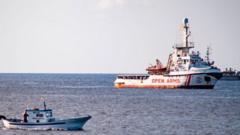As the trial of Italian Deputy Prime Minister Matteo Salvini comes to a close, a verdict is anticipated soon. Salvini is accused of kidnapping and dereliction of duty for preventing the Open Arms rescue boat, which was carrying 147 migrants, from docking in Italy in 2019. Prosecutors have requested a six-year prison sentence, contending that the rights of those at sea should take precedence over state sovereignty.
Italy's Deputy PM Salvini Awaits Verdict in Controversial Migrant Rescue Case

Italy's Deputy PM Salvini Awaits Verdict in Controversial Migrant Rescue Case
Matteo Salvini faces serious charges over his actions during the migrant rescue boat incident in 2019, with potential implications for his political future.
The Open Arms had been stranded off the Italian island of Lampedusa for nearly three weeks under Salvini's orders, while the health conditions of the migrants onboard worsened. Despite these allegations, Salvini has defended his actions, claiming he was acting to protect Italy and promising to appeal if found guilty.
Support from fellow government officials, particularly from Prime Minister Giorgia Meloni, reflects the political weight of this case. Meloni has asserted her unwavering support for Salvini, emphasizing that a conviction would set a dangerous precedent regarding border security. Amid mounting tensions, the trial has drawn attention from both domestic and international figures, echoing concerns about politicization within the judiciary.
Salvini's party, the right-wing Lega, has coordinated demonstrations in his favor, asserting the trial represents a broader conflict over national identity and migration policy. As the verdict looms, the implications of this case extend beyond Salvini, potentially impacting the political landscape and migration discourse in Italy for the foreseeable future.
Support from fellow government officials, particularly from Prime Minister Giorgia Meloni, reflects the political weight of this case. Meloni has asserted her unwavering support for Salvini, emphasizing that a conviction would set a dangerous precedent regarding border security. Amid mounting tensions, the trial has drawn attention from both domestic and international figures, echoing concerns about politicization within the judiciary.
Salvini's party, the right-wing Lega, has coordinated demonstrations in his favor, asserting the trial represents a broader conflict over national identity and migration policy. As the verdict looms, the implications of this case extend beyond Salvini, potentially impacting the political landscape and migration discourse in Italy for the foreseeable future.




















